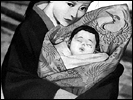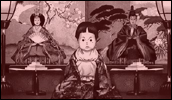Millennium Actress
- Year
- 2002
- Original title
- Sennen Joyu
- Japanese title
- 千年女優
- Director
- Cast
- Running time
- 87 minutes
- Published
- 26 August 2002


by Michael Arnold
Ask any otaku in the know: Satoshi Kon is one of the hottest names in Japanese animation today. His first feature Perfect Blue (1998) stretched the limits of animated film to make a comment on media representation and spectatorship, and in that sense it actually lived up to anime's sometimes overblown reputation as a genre that mature audiences can enjoy. It may have lacked the momentum to make a clear statement though, ultimately sinking into some of the same techniques that it tried to criticize. Kon's new Millennium Actress - certain to bring him even more attention in the West - tackles a similar theme in a slightly different way but the result is still a mixed bag.
Small-time video producer Genya Tachibana takes his cameraman assistant to meet a long-lost former movie star. In a comment on the continuing disintegration of the old studio system in Japan, the film studios Chiyoko Fujiwara worked for are being demolished, and the men have been hired to interview the star and document her life. They track her down at home and ask her to share some stories from her years as an actress working through the Golden Age of film in Japan, against the backdrop of the tumultuous 20th century.
The aging woman greets her guests warmly, and once she starts remembering the living room transforms into the scene of her memories. We see how a youthful Fujiwara's first step into film was tied into her chance encounter with a young artist on the run from the wartime authorities. She offers him shelter and falls in love, and when he escapes to Manchuria she vows to meet him again. In order to keep her promise she decides to accept her first role, in a Japanese propaganda film being made in the colony where her sweetheart has fled.
The story takes off and we're sucked into the action, watching as the heroine travels through history and jumps from one movie set to another while making films and chasing after her dream lover. Incidentally the two male interviewers start to appear in the elderly woman's memories as well, observing from the sidelines and commenting on the history happening before them with digital camera in hand. Tachibana is a huge fan of Fujiwara's work, and his comic remarks give us a few more clues into the twists and turns her life has taken, including the mystery surrounding the elusive "key" that would unlock her dreams. Fujiwara's search leads her to dramatic highs and tragic lows as the audience enjoys a roller coaster ride through the actress's sweat and tears.
Along the way Millennium Actress treats us to a number of parodies of film classics. The story opens and closes with a bang in a setting like 2001: A Space Odyssey (1968) and it borrows an important scene from Kurosawa's Throne of Blood (1957) when the young Fujiwara is cursed by an old lady on a spinning wheel. Later there are glimpses of the Truck Yaro series, action flicks à la Shintaro Katsu and Ken Takakura, and many others. Kon obviously knows his movies, and as the distinction between Fujiwara's real memories and cinematic memories gets more and more blurred this fictional film history becomes the highlight of the story. If Perfect Blue was partly a lament over the excesses in Japanese visual media today then maybe this is a tribute to what has been lost over the years.
Like its predecessor, though, while Millennium Actress does start with great gusto it turns its back on a few of the issues it raises, leaving the story too pristine for its own good. Kon has his work cut out for him: "woman" is a very common theme in Japanese film, perhaps even a genre in itself. Throughout the 20th century male directors including Mizoguchi, Naruse, Imamura, and many others, in everything from program pictures to pornos, energetically contributed to a modern mythology of the Japanese female, assigning her the spirit and character to resist the forces that bound her. Foreign viewers are sometimes too quick to simply label these films "feminist"; as others have noted the movies can objectify their heroines and create lustworthy spectacles out of their trials rather than suggest possibilities for change and empowerment.
On one level Perfect Blue aims for a more honest look at how these female objects of affection are created, and that's why the film's critique is initially so engaging. We're obliged to track down the exploitation that haunts Mima in the media system and look at where and who it comes from. Later, though, the examples of abuse we were shown turn out to be straw men, so to speak, and our grounds to criticize them - and think about our own role as viewers - evaporates. The responsibility to correct things lands right where the media in real life already puts it, on the actresses, or more generally women, themselves.
Millennium Actress is even more specifically about films on women but it doesn't try nearly as hard to make a comment. Instead of critically addressing the spectacle it simply enjoys the view. The actress isn't raped or otherwise physically attacked this time, she's just watched (while Perfect Blue was branded with a R-15 rating for its violence, Millennium Actress received a grant from the Japanese Agency for Cultural Affairs), but rather than use that view to take a fresh look at 'history' Kon delivers the standard tear-jerking melodrama. We're asked to become the otaku like Tachibana and ogle over Fujiwara during her time as a mover and shaker in the film industry, but the actress seems less devoted to her life's work than she is to the romantic idea of chasing a phantom lover and she never really gets a grip on anything else. The viewer has more of a hand in her story, as he's the one who carries the camera and the key to unlock doors to the past and view these private memories from the outside. Fujiwara ends up like the empty vessel Laura Mulvey wrote about nearly 30 years ago, "still tied to her place as bearer of meaning, not maker of meaning," and in an otherwise "post-modern" story that is so explicitly about men who watch films on women the adoration of such a shallow character is very frustrating (especially with a unique and talented director like Kon at the helm). Millennium Actress is Kon's second shot at the feminisuto genre, and like so many of his predecessors he still misses the target.